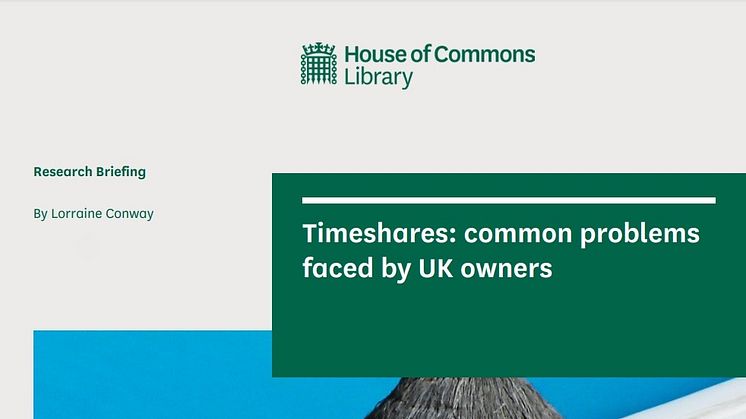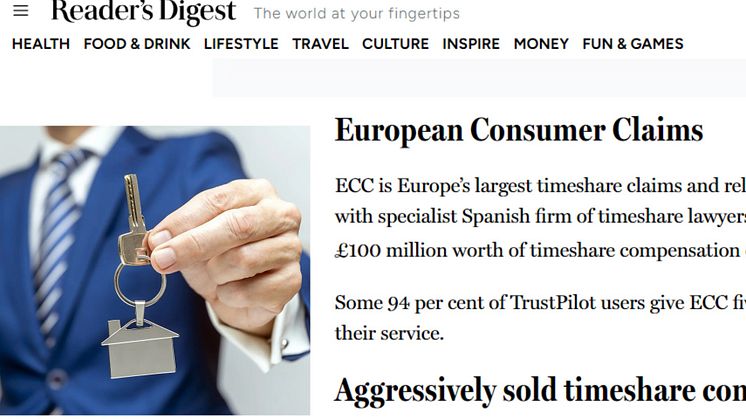
Press release -
House of commons research paper outlines timeshare product failures
House of Commons publishes Research Briefing on issues facing British timeshare owners
Large scale consumer fraud
Timeshare has been sold since the 1960s but exploded into mainstream culture in the 1980s and 1990s when infamous UK gangster John 'Goldfinger' Palmer (as portrayed in gripping BBC drama The Gold) launched industrial level sales and marketing operations in Tenerife. His first resort was the the giant Island Village complex, but he expanded to 10 other lucrative locations.

After Palmer opened the door, a flood of suspect individuals and organisations launched their own timeshare resorts targeting mainly Brits in Tenerife, mainland Spain, Cyprus, Malta and Portugal. Pretty soon any tourist holidaying in these destinations had to run a gauntlet of aggressive, commission-only young men and women called OPCs desperate to lure them to a timeshare presentation.
For those who succumbed there was a several hour long, high pressure presentation.
For those who signed up there was often a series of expensive disappointments as they returned to holiday in apartments that were not built; discovered that various sales promises were false; faced further high pressure upgrade pitches and had to endure ever spiralling maintenance fees.
Government level concern

Barely a week went by in the timeshare heyday without a related horror story in the media. To safeguard tourists (and tourism itself) laws were passed, then refined by the EU and adopted by various governments. Most notably in Spain where the vast majority of underhand timeshare deals were made.
From 1999 onwards, timeshare consumers were theoretically protected from making harmful, rash decisions. Unfortunately many resorts ignored the protective laws.
British tourists have made up the significant majority of victims, and consequently the UK government has become increasingly concerned with the scale of the timeshare problem over the years.
The latest development is an official House of Commons Research Briefing (HCRB). HCRBs are generated to crystallise issues in preparation for MPs to debate, or propose and vote on measures to take. In this case potentially to protect British citizens from losing money to timeshare operations.
The report starts with an introduction, covering various definitions and referencing the relevant existing laws before detailing the main issues facing timeshare owners today.
Key takeaways from the HCRB
- The average timeshare owner is ageing: "Many owners bought their timeshares in the 1980s or 1990s, their average age being around 50 to 60 years old (rising each year). As time passes, some owners may be unable to travel or may find management fees for their timeshare unaffordable."
- People are trapped: "Some contracts make little or no provision for exiting the timeshare, while others contain ‘in-perpetuity’ clauses creating the potential for the owner’s liabilities to pass on death to their children. To exit their timeshare, owners often need to find someone who is willing to acquire it."
-
Resale potential is minimal: "Overall, supply far exceeds demand: the number of weeks offered for sale is much greater than the number of weeks being bought each year. According to the CMA, difficulty in exiting timeshares provides an opportunity for resale scams."
-
Management fees are increasing at a seemingly uncontrolled rate: "Some owners who cannot afford to pay these fees (in breach of their contractual obligation) are threatened with, or have faced, legal action for non-payment.
-
UK owners at UK resorts may have some protection under Common Law: Businesses cannot always argue successfully that their obligations to consumers are dictated solely by what it says in the contract. There may be scope for challenging an unfair contract term, particularly where the term would place an onerous restriction on the consumer. For example, terms that
purport to be estate-binding. (ie in-perpetuity clauses)"
-
...but owners in other countries may have differing levels of protection and enforcement potential: "With resorts spread across a wide geographical area (with many located in Spain, Portugal, Greece, and Malta), it is important to note that the terms and conditions of individual timeshare or Long Term Holiday product (LTHP) agreements will vary, and there may be unique legal complexities and jurisdictional issues in seeking to buy or exit a timeshare or LTHP."
-
A Spanish Supreme Court judgement gives members of Spanish resorts legal recourse: "In May 2015, the Spanish Supreme Court ruled that an “in-perpetuity” clause included in a timeshare contract (between a Norwegian individual and the Gran Canaria based Anfi Group) was illegal under Spanish law."
-
Beware of scam exit and claims firms: "There are many individuals willing to take advantage of timeshare owners by
the mis-selling of holiday products or timeshare exit schemes. Timeshare victims should get credible advice before agreeing to any timeshare termination or exit procedure."
You can read the report in full here.
So what next if I have a timeshare problem?
"The government is moving in the right direction by acknowledging the issues," comments Andrew Cooper, CEO of European Consumer Claims (ECC). "However any practical or effective government responses are likely to be several years away and may not be retroactive.
"For people who need help or answers more urgently: get in touch with our team for a free consultation on your options."

Related links
- House of Commons Research Briefing. Timeshares: common problems faced by UK owners
- The Gold: BBC iPlayer
- Blaggers: Adventures in the Spanish timeshare industry in the 1980s and 1990s
- Escaping unwanted timeshare memberships
- European Consumer Claims
- ECC contact details
- Out of control timeshare maintenance fee hikes: A case study interview
- Looking to escape your timeshare? Here are the pitfalls to avoid
- Crippling 30% maintenance fee increase misery for timeshare owners
- A deeper look at the perpetuity clause
- Timeshare free and loving life
- Anfi: The story behind the news
Topics
Categories
Regions
TAC provides timeshare claims services, relinquishments expert advice and help
E: (for media enquiries): mark.jobling@ecc-eu.com
E: (for client enquiries) EUROPE: info@timeshareadvicecentre.co.uk USA: info@timeshareadvicecentre.us
T: EUROPE: +44 800 102 6070/+44 203 807 3388. USA: 1-888 203 5448/ 1-332 867 1213
Monday to Friday: UK timings: 9am-8pm. Saturday/Sunday closed. USA 9am -8pm EST. Sunday closed
Follow Timeshare Advice Centre UK on Facebook here. Timeshare Advice Centre US here
Follow Timeshare Advice Centre UK on Twitter here. Timeshare Advice Centre US here
Relevant websites for this article


























